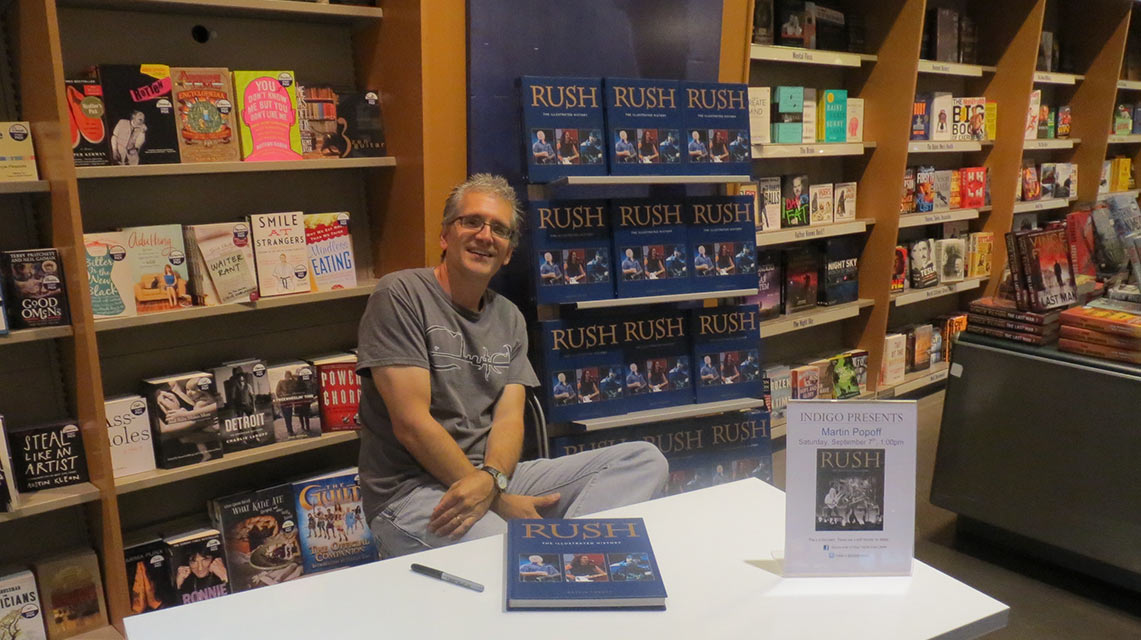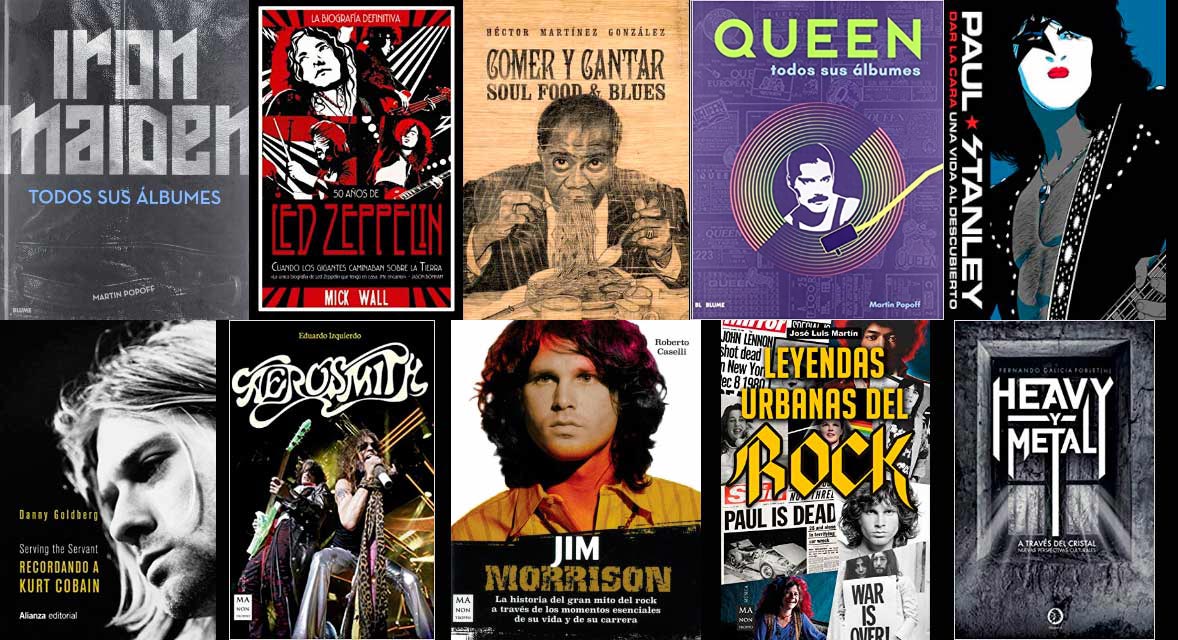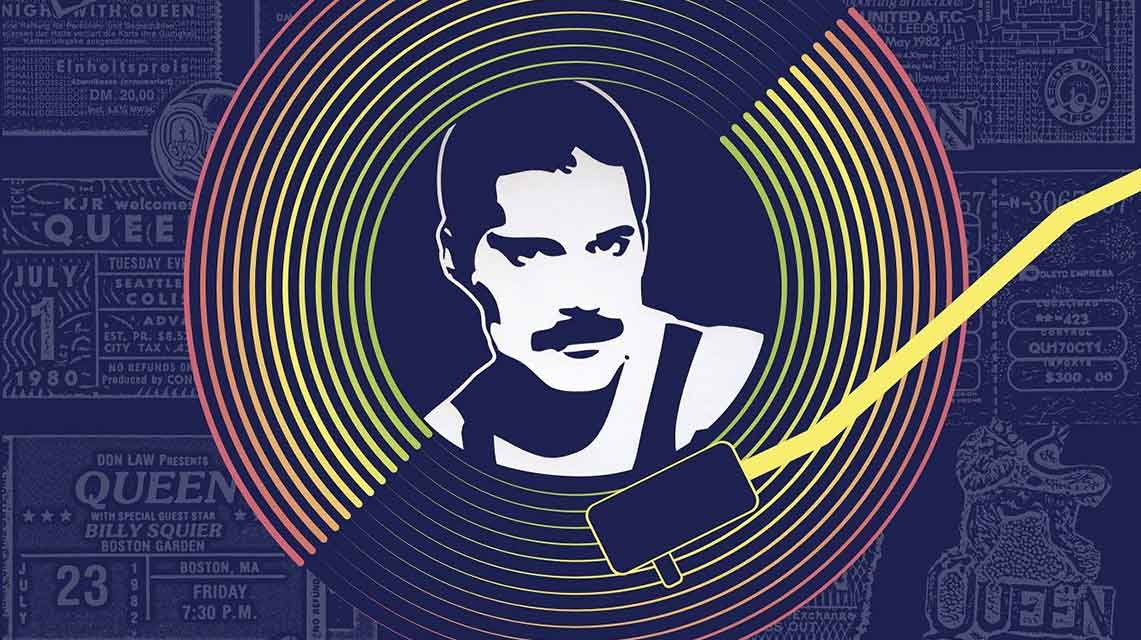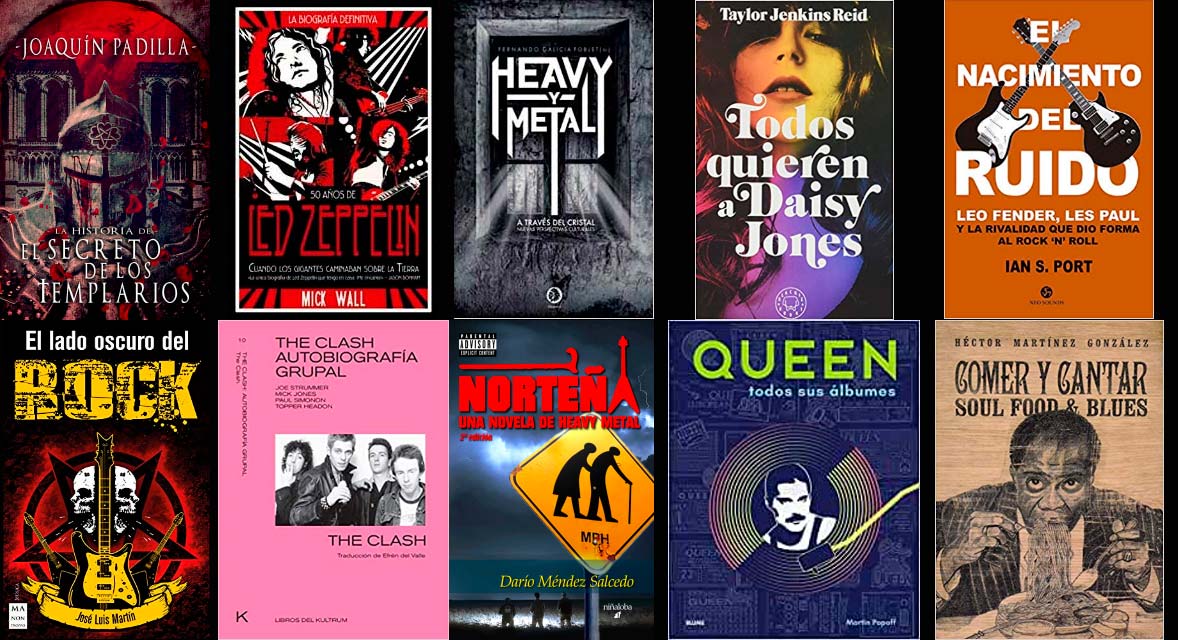Es más que un honor poder charlar con Martin Popoff, escritor hiperactivo donde los haya… Más de 80 libros, más de 1500 entrevistas a grupos avalan a uno de los mejores escritores sobre libros de metal de la actualidad… Editorial Blume ha estado editando algunos de sus últimos títulos sobre Iron Maiden, Queen o Led Zeppelin por decir alguno… Nos acercamos más a la persona y nos enteramos de su extensa y dilatada carrera, os dejamos con sus declaraciones…
ENLGISH VERSION BELOW
David Aresté
M.S: Hola Martin, es un honor tenerte en nuestra página, ¿cómo estás?
Bueno, dada la situación del virus, hacer frente, pero por supuesto no debería quejarme. Aquí en Toronto, no es China, Corea del Sur, Italia o España … ¡todavía! Acabando trabajo, trabajando en el tercer libro de mi trilogía de Iron Maiden, y descubriendo qué voy a hacer para mi próximo episodio de “History in Five Songs with Martin Popoff”. Pero sí, la mayoría de las empresas están cerradas en Toronto. Y, por supuesto, se alienta a las personas a quedarse.
MS: Editorial Blume ha publicado algunos de tus últimos libros en España … pero has estado escribiendo 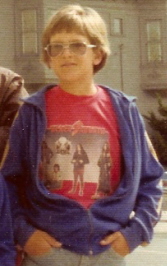 y editando libros toda su vida … cuéntanos para aquellos que no te conozcan cuando te interesa la escena rock/metal y cuando piensas en escribir libros al respecto …
y editando libros toda su vida … cuéntanos para aquellos que no te conozcan cuando te interesa la escena rock/metal y cuando piensas en escribir libros al respecto …
He sido un metalero bastante obsesionado desde que tenía nueve o diez años, 1972, 1973: Sabbath, Purple, Nazareth, Zeppelin, then Ted Nugent, Kiss, Rush, Aerosmith, los “sospechosos” habituales. Sin embargo, no escribí mi primer libro sobre esto hasta 1993, así que tenía 30 años. Ese fue un libro de cerca de 2000 reseñas de discos. Ese libro fue reeditado por un editor más apropiado en 1997,y tuvo mucho éxito. Pero sí, también en 1994, empecé a trabajar en una revista que comenzó Tim Henderson, Brave Words & Bloody Knuckles. Entonces, a partir de ese momento, estaba entrevistando a muchas estrellas de rock, lo que hizo que fuera mucho más fácil sentir que tenía un buen material para poner en forma de libro. Entonces, en este punto, he hecho de 85 libros, 1800 entrevistas, y la mayoría de eso realmente se está incrementando cuando me pasé a tiempo completo en el año 2000.
M.S: ¿Qué proceso sigues cuando escribes? ¿Cuánto tiempo te lleva hacer la documentación para escribir sobre un tema?
Por lo general, no pienso en escribir un libro en una banda a menos que los haya entrevistado 15 o 20 veces. En los primeros días, también quería escribir libros sobre bandas en las que no había libros, y, por supuesto, siempre son las bandas las que realmente siento que conozco muy bien, de modo que tengo la satisfacción de expresar mis opiniones. Y para responder a tu pregunta, hay un proceso específico. Comienzo lo que llamo un archivo mainframe, y luego tomo entrevistas que tengo, junto con la prensa disponible, y empiezo a ubicar las cosas en su lugar. Generalmente me gusta escribir un capítulo por álbum. Cuando se trata de un libro de banda, y comienzo con el proceso de escritura, grabación, mezcla, portada del álbum, y luego cada canción, y luego un resumen al final de qué tan bien le fue en el mercado o cualquier crítica, y luego hablo sobre la gira.
Así que tengo esas grandes divisiones y básicamente coloco las cosas en su lugar para que tu mente no esté completamente confundida sin saber qué hacer a continuación. Entonces, es una forma bastante lineal simplemente pasar por lo que tengo y hacer que suene coherente, y coherente dentro de cada uno de esos pequeños módulos. Entonces, sí, hay un gran mainframe grande e individual, y luego puedo meterlo metódicamente. También tiendo a fijar fechas para que las cosas fluyan cronológicamente. De hecho, muchos de mis libros son libros líneas cronológicas con solo líneas de tiempo y citas. No hay una respuesta adecuada a la pregunta de cuánto tiempo. Reuní todas estas entrevistas a lo largo de los años, y luego me puse a ello. Pero una vez que decido escribir un libro, usualmente toma alrededor de dos meses, ¿trabajar en ellos tal vez medio día por día? Espero no pasar más de un mes sólido en ningún libro.
M.S: ¿Cuál libro fue el más largo de escribir y por qué?
Creo que la respuesta a eso sería la “Goldmine Heavy Metal Records Price Guide”, aproximadamente en el año 2000. Fue un proyecto de tipo de base de datos masivo, que reunió muchos registros, títulos, números de catálogo, información de etiquetas de registro, poniendo muchas notas, y luego llegar a un precio para cada uno. Trabajo bastante mundano, pero al hacerlo en el año 2000, todavía es bastante anterior a Internet, aunque Internet había comenzado alrededor de 1996. Por lo tanto, todavía se trataba de toneladas y toneladas de diferentes fuentes para llegar a una especie de consenso sobre precios. Además, los libros de revisión de registros que he hecho han tomado mucho tiempo. Finalmente hubo cuatro de ellos divididos en décadas, con alrededor de 7000 revisiones de registros en ellos.
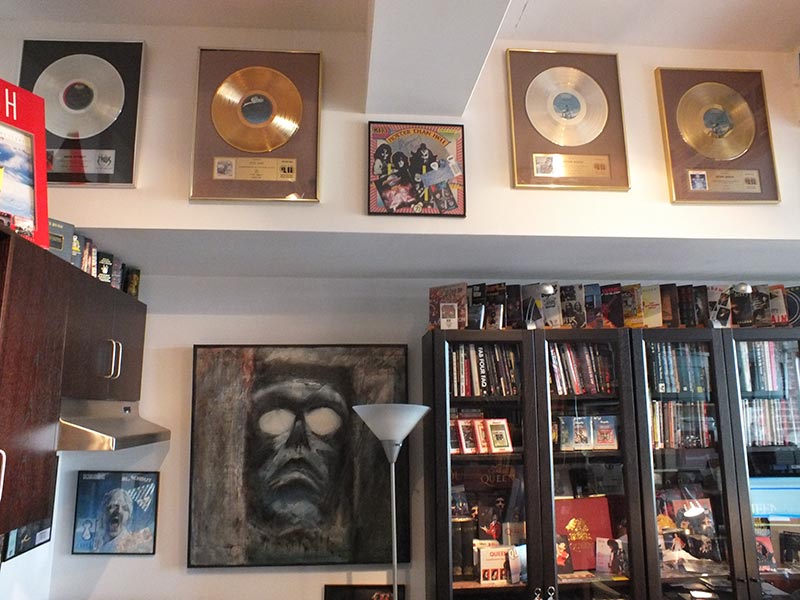
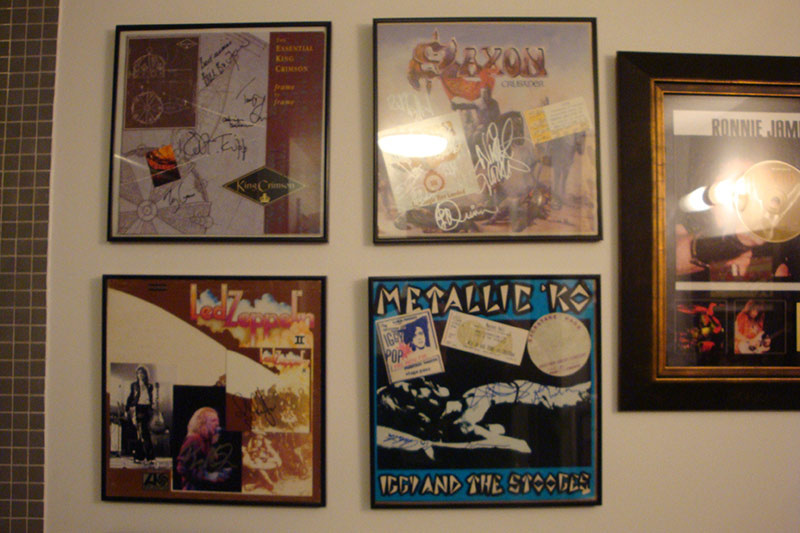
M.S: Supongo que no puedes decirlo … pero, ¿cuál consideras que es tu mejor libro?
Estoy muy orgulloso de los dos libros que hice sobre Led Zeppelin y The Clash, donde tuve que analizar cada canción del catálogo con una descripción de 400 a 500 palabras, o, me equivoco, cada canción que estaba en los álbumes. Me criticaron por no incluir todas las canciones que no son de Clash. De todos modos, eso fue bueno, profundo, escritura académica, mucho análisis con auriculares puestos, escuchando palmadas y panderetas y coros, viendo lo que estaba en el canal derecho, canal izquierdo. También me gusta mucho mi “Who Invented Heavy Metal?”, que tenía 120,000 palabras de cronología y citas que terminaron en 1971. Un examen bastante exhaustivo de todo lo que cualquiera podría pensar con respecto a la invención del heavy metal.
M.S: En todos estos años me imagino que has conocido a muchos músicos … ¿cuál te ha sorprendido más?
La palabra “sorprender” es interesante. Tal vez los gustos de Joe Lynn Turner, a quien realmente me gusta como persona. Además, tiene muchas cosas interesantes que han sucedido en su vida que apenas insinúa. Bill Ward también fue una entrevista genial, un tipo muy agradable, muy emotivo. No sé si Zakk Wylde o Ted Nugent son particularmente sorprendentes, pero definitivamente fueron entrevistas interesantes y divertidas. Ambos muy ingeniosos, muy agudos.
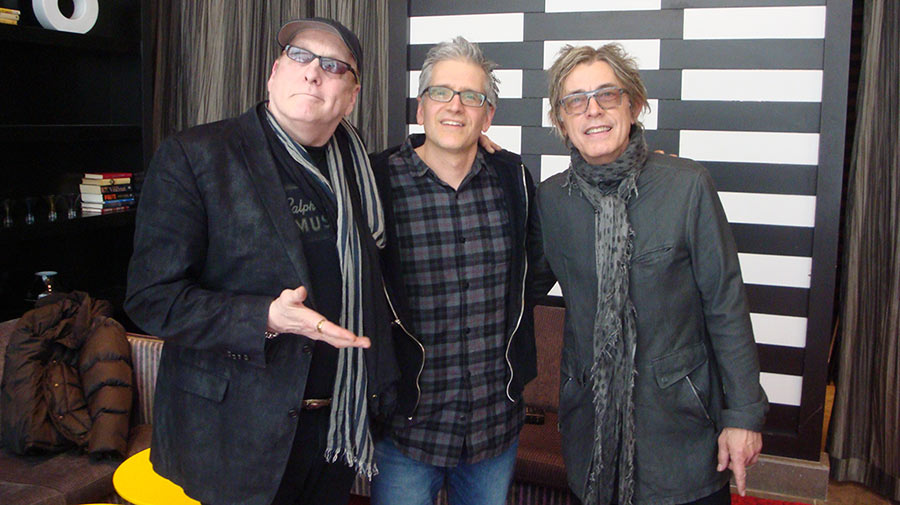
M.S: En la era en que pasamos nuestras vidas frente a una pantalla … ¿qué papel tienen los libros en nuestro día a día?
Bueno, la prueba que a la gente todavía le gustan los libros impresos es que los libros electrónicos han alcanzado su punto máximo o estancado, y la industria de la impresión está viva y bien. No tiene una gran magia, y uno no es mejor que el otro, es solo que un libro impreso sigue siendo relativamente barato, y te aleja de la pantalla y se puede leer en la silla de allí , en la playa o en el avión sin problema. Pegas un marca páginas en él, siempre y cuando tengas buena luz tus ojos descansan al mirar la pantalla, no estás sentado en el escritorio frente a la computadora, no estás entrecerrando los ojos en un teléfono, no estás tratando con una computadora portátil en tu regazo. Sigue siendo una forma bastante decente de entregar la palabra impresa. Quiero decir, nunca lo pensé de esta manera, pero mira lo complicado que es reproducir un disco en comparación con la reproducción de canciones. El abismo no es tan amplio entre un libro impreso y un lector electrónico. De hecho, probablemente no haya ninguna brecha, y tal vez incluso el libro impreso sea mejor.
M.S: Con unos pocos clics del mouse tenemos mucha información, imaginamos que para cada libro intentas encontrar algo que los haga especiales con respecto a lo que podemos encontrar por Internet, ¿no?
Sí, y aunque me gusta usar la prensa, citando artículos de revistas y cosas por el estilo, como dije anteriormente, ni siquiera pienso en escribir un libro en una banda a menos que traiga montones y montones a la mesa. Los libros de The Clash y Led Zeppelin fueron excepciones, porque fui yo quien analizó las canciones, como un científico, pero The Clash es un buen ejemplo de una banda en la que nunca escribiría un libro normal, porque nunca he entrevistado a un solo miembro de The Clash! Pero tengo muchísimas imágenes de entrevistas con todas las demás bandas en las que escribo un libro, y eso es lo principal. Pero también, curiosamente, hacer ese de The Clash y ese libro de Led Zeppelin me ha inspirado a poner más análisis de canciones en todo lo que hago. Entonces, lo que estoy trayendo a estos libros normales, las biografías normales en las bandas, ahora… es una combinación de muchos de mis propios videos, algunas citas de la prensa disponible, pero también mucha de mi propia opinión y muchos análisis objetivos de canciones, y solo muchos factoides en particular. De hecho, los libros cronológicos que tengo me han inspirado a poner muchas fechas también. Entonces, al final, sí, ¡creo que ya tienes suficientes cosas nuevas!
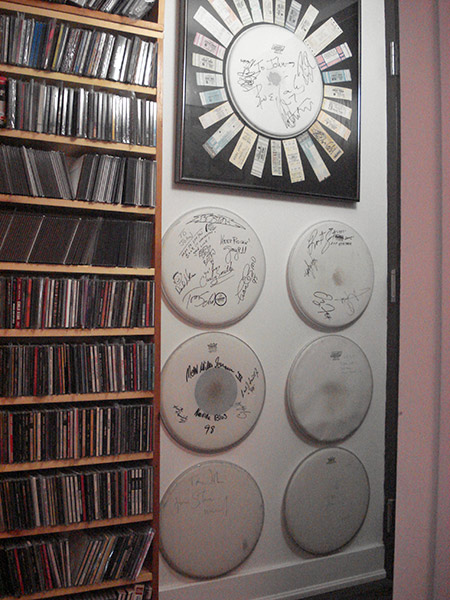
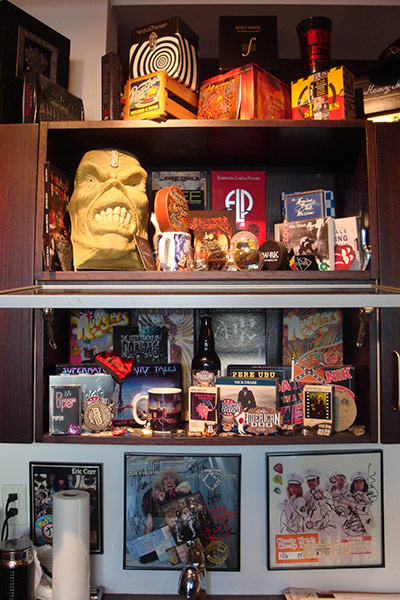
M.S: ¿Hay alguna canción o músico sobre la que te gustaría escribir y que aún no hayas hecho?
Sí, me gustaría hacer un libro sobre The Damned. Y hay otras bandas que adoro, pero no estoy seguro de tener algo que pueda aportar, que sea valioso, en bandas como The Jam y XTC. Luego hay otras situaciones, como Kiss, en las que me considero un experto suficiente, pero ha habido tantos libros sobre Kiss, sin mencionar todos los que han escrito ellos mismos, que hacer un libro de Kiss me aburre. Básicamente, sé que todo lo que voy a decir ya se ha dicho. Pero quien más? Morrissey, Kate Bush, Magazine, Buzzcocks … Hay muchos.
M.S: ¿Qué planes tienes pronto? ¿Tienes una fecha para tu próximo libro?
El próximo será “Empire of the Clouds: Iron Maiden in the 2000s”. En la imprenta tengo a está “Denim and Leather: Saxon’s First Ten Years”. También salgo en breve con “Blue Oyster Cult: A Visual Biography”, junto con tres grandes libros enormes de Rush que acabé hace tiempo, casi un año, de hecho. Podría hacer un libro que recoja todos mis artículos sobre Blue Cheer, MC5, Iggy & the Stooges, New York Dolls y The Dictators. Pero también tengo una especie de proyecto extraño de diseño que quiero seguir, imaginando o adaptando algunos de mis anuncios discográficos favoritos, y parece que me estoy centrando en como hacerlo.
MS: Gracias por tu tiempo, ha sido un honor como dijimos tenerte aquí … si deseas decir un último mensaje a nuestros lectores, es tu momento, buena suerte y estamos esperando tus nuevos libros. ..
Gracias por la oportunidad. Todos mis libros editados se pueden obtener en martinpopoff.com. O pueden preguntarme lo que sea en martinp@inforamp.net. Se puede pagar con PayPal para internacionales, EE. UU. Y Canadá, firmo y envío todo desde mi oficina aquí en Toronto. Además, me encantaría que la gente escuche mi podcast llamado History in Five Songs con Martin Popoff. Tengo unos 38 episodios ahora. Por último, tenemos un programa genial de YouTube llamado The Contrarians, donde discutimos sobre álbumes que son nuestros favoritos, aunque a veces nos equivoquemos. ¡Eso es todo y gracias por pensar en mí!
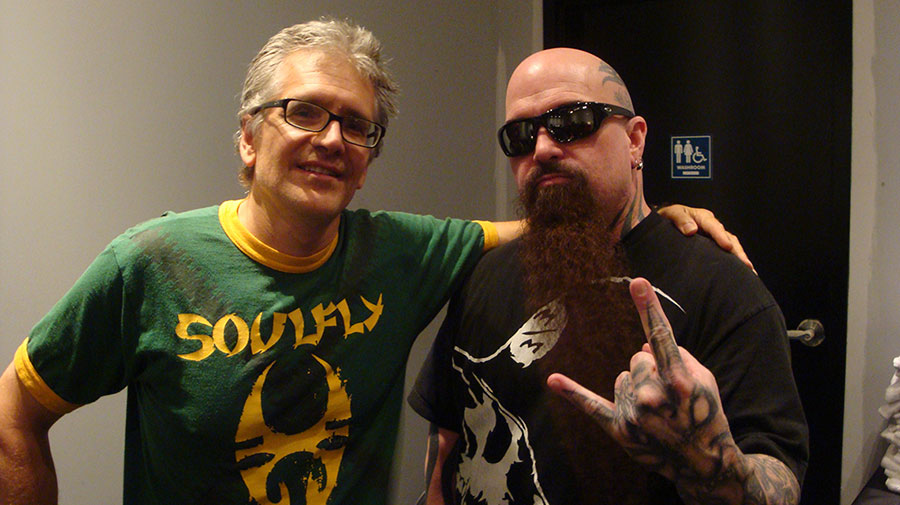
David Aresté
| ENGLISH VERSION |
M.S: Hello Martin, it is an honour to have you for our page, how are you?
Well, given the virus situation, coping, but of course I shouldn’t complain. Here in Toronto, it’s not China or South Korea or Italy or Spain… yet! Getting work done, working on the third book of my Iron Maiden trilogy, and figuring out what I’m going to do for my next episode of History in Five Songs with Martin Popoff. But yes, most businesses are closed down in Toronto. And of course people are encouraged to stay in.
MS: Editorial Blume has published some of your latest books in Spain … but you have been writing and  editing books all your life … tell us for those who do not know you how you are and when you interested in rock/metal scene and when you think of writing books about it .. .
editing books all your life … tell us for those who do not know you how you are and when you interested in rock/metal scene and when you think of writing books about it .. .
I’ve been a pretty obsessed metalhead since I was about nine or 10 years old, 1972, 1973 – Sabbath, Purple, Nazareth, Zeppelin, then Ted Nugent, Kiss, Rush, Aerosmith, the usual suspects. I didn’t write my first book about it until 1993, though, so I would’ve been 30. That was a book of close to 2000 record reviews. That book got reissued by a proper publisher in 1997, and then it was off to the races. But yes, also a 1994, I just started working on a magazine that was begun by Tim Henderson, Brave Words & Bloody Knuckles. So from that point forward I was interviewing lots of rock stars, which made it much easier to feel like I had good material to put into book form. So at this point, it’s about 85 books, 1800 interviews, with most of that really ramping up when I went full time in the year 2000.
M.S: What process do you follow when you write? How long does it take you to do the documentation to write about a topic?
Usually I don’t think about writing a book on a band unless I’ve interviewed them 15, 20 times. In the early days I also wanted to write books on bands that there’d been no books on, and of course it’s always bands I really feel like I know super well, so that I have the satisfaction of putting my opinions into them. And to answer your question, there is a specific process. I start what I call a mainframe file, and then I take interviews that I have, along with the available press, and start slotting things into place. I usually like to write one chapter per album. When it’s a band book, and I start with the writing process, recording, mixing, album cover, and then each song, and then a summary at the end of how well it did in the marketplace or any reviews, and then talk about the touring cycle. So I have these big headings and I basically slot things into place so your mind isn’t completely scrambled not knowing what to do next. Then it’s a pretty linear fashion just going through what I have and making it sound cohesive and coherent within each of those little modules. So yes, there’s this loose big huge mainframe, and then I can just poke away at it methodically. I also tend to put down dates so things flow chronologically. In fact, many of my books are timeline books with just timelines and quotes. There’s no proper answer to the how long question. I gather up all these interviews over the years, and then I get down to it. But once I decide to write a book, it usually takes about two months, working on them maybe half a day per day? So hopefully I’m not spending more than a solid month on any book.
M.S: Which book was the longest to write and why?
I think the answer to that would be the Goldmine Heavy Metal Records Price Guide, back in about the year 2000. It was a massive database type project, gathering lots of records, titles, catalogue numbers, record label information, putting in a lot of notes, and then coming up with a price for each one. Pretty mundane work, but doing that back in about the year 2000, it’s still pretty much pre-Internet, although the Internet had started about 1996. So it was still dealing with tons and tons of different sources to come up with sort of consensus on pricing. Plus the record review books I’ve done have taken a long time. There were eventually four of them split up into decades, with about 7000 record reviews in them.


M.S: I suppose you can not say it … but what do you consider to be your best book?
I’m pretty proud of the two books I did on Led Zeppelin and The Clash, where I had to analyse every single song in the catalogue to the tune of 400 to 500 words, or, correction, every song that was on the albums. I got a little bit of abuse for not including all the Clash non-album songs. Anyway, that was good, deep, scholarly writing, lots of analysis with headphones on, listening for handclaps and tambourines and backing vocals, seeing what was in the right channel, left channel. I also really like my Who Invented Heavy Metal? book, which was 120,000 words of timeline and quotes that ended in 1971. A pretty exhaustive examination of everything anybody could possibly think of with respect to the invention of heavy metal.
M.S: In all these years I imagine you have met many musicians … which one has surprised you the most?
Interesting, the word surprised. Perhaps the likes of Joe Lynn Turner, who I really like as a person. Plus he’s got a lot of interesting things that have gone on in his life that he barely hints at. Bill Ward is also such a great interview, such a nice guy, very emotional. I don’t know if Zakk Wylde or Ted Nugent are particularly surprising, but they’re definitely interesting and fun interviews. Both very humorous, sharp wits.

M.S: In the era in which we spend our lives in front of a screen … what role do books have in our day to day?
Well, the proof in the pudding that people still like printed books is that e-books have kind of peaked or plateaued, and the print industry is alive and well. There’s no great magic to it, and one isn’t better than the other, it’s just that a printed book is still relatively cheap, and it gets you away from the screen and can be read in the chair over there, or the beach over here or on the plane pretty conveniently. You stick a marker in it, as long as you’ve got good light, it rests your eyes from looking at the screen, you’re not sitting in the desk in front of the computer, you’re not squinting into a phone, you’re not dealing with a laptop on your lap. It’s just still a pretty decent way to deliver the printed word. I mean, I never thought of it this way, but look at how complicated it is playing a record compared to streaming songs. The gulf isn’t nearly that wide between a printed book and an e-reader. In fact, it’s probably no gap at all, and maybe even the printed book is better.
M.S: A few clicks of the mouse we have a lot of information, we imagine that for each book you try to find something that makes them special with respect to what we can find online, isn’t it?
Yes, and although I do like to use the available press, quoting for magazine articles and such, like I said above, I don’t even think about writing a book on a band unless I am bringing lots and lots to the table. The Clash and the Led Zeppelin books were exceptions, because the it was me analysing the songs, like a scientist, but The Clash is a good example of a band I would never write a normal book on, because I’ve never interviewed a single member of The Clash! But I have lots and lots of interview footage with every other band that I write a book on, and that’s the main stuff. But also, interestingly, doing that Clash and that Led Zeppelin book has inspired me to put in more song analysis into anything I do. So what I’m bringing to these normal books, the normal biographies on bands, now, is a combination of lots of my own footage, some quoting from the available press, but also lots of my own opinion and lots of objective song analysis, and just lots of factoids in particular. In fact, the timeline books I do have inspired me to put in lots of dates as well. So by the end of it, yes, I do believe you’ve gotten enough new stuff!


M.S: Is there a song or musician you would like to write about and have not done yet?
Yes, I would like to do a book on The Damned. And there are other bands I adore, but I’m not sure I have anything I can bring to the table, that is of value, on bands such as The Jam and XTC. Then there are other situations, like Kiss, who I consider myself enough of an expert on, but there been so many books on Kiss, not to mention all the ones they’ve written themselves, that doing a cKiss book kind of bores me. Basically, I know anything that I’m going to say has already been said. But who else? Morrissey, Kate Bush, Magazine, Buzzcocks… There are many.
M.S: What plans do you have soon? Do you have a date for your next book?
The next one will be Empire of the Clouds: Iron Maiden in the 2000s. At the printer right now is Denim and Leather: Saxon’s First Ten Years. I’ve got coming out shortly as well, Blue Oyster Cult: A Visual Biography, along with three big thick Rush books that have been finished for months, almost a year, in fact. I might do a book that anthologizes all my writings on Blue Cheer, MC5, Iggy & the Stooges, New York Dolls and The Dictators. But I also have a sort of weird art project I want to pursue, imagining or adapting some of my favourite record ads, in art form, and I seem to be settling on the medium of pencil crayon on black stock.
M.S: Thank you for your time, it has been an honour as we said to have you here … if you want to say one last message to our readers, it’s your time, good luck and we are waiting for your new books …
Thank you for the opportunity. All of my books that are in print can be gotten through me at martinpopoff.com. Or you can ask me whatever at martinp@inforamp.net. There are PayPal buttons there for international, US and Canada, and I sign and send everything out right from my office here in Toronto. Also, I would love it for people to take a listen to my podcast called History in Five Songs with Martin Popoff. I’m up to about 38 episodes now. Lastly, we’ve got a cool YouTube show called The Contrarians, where we argue about albums from catalogues that are our favourites, that might not be the obvious choice. That’s it, and thanks for thinking about me!

David Aresté

